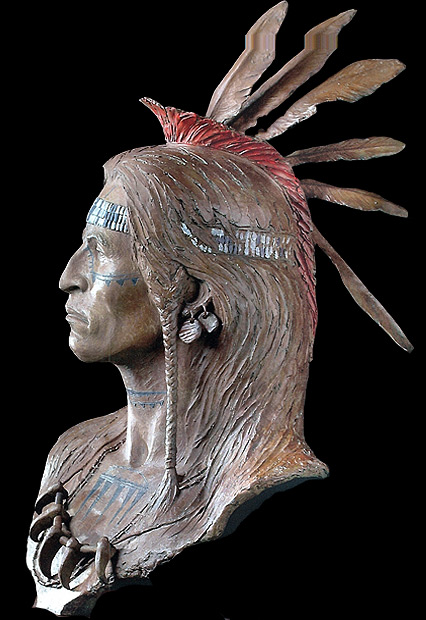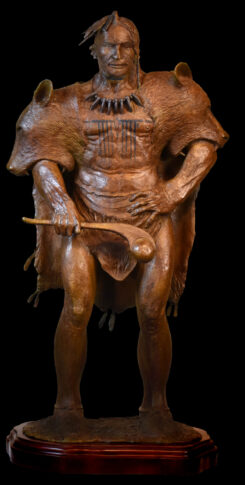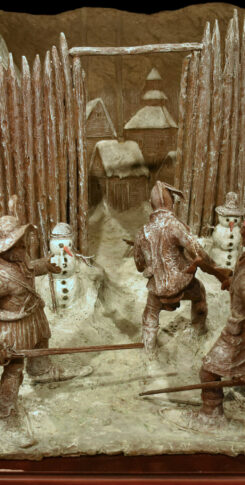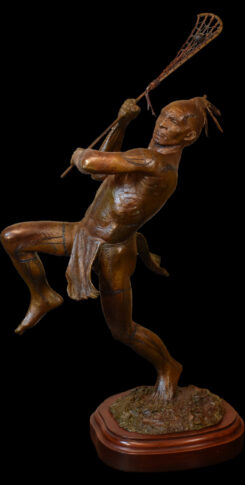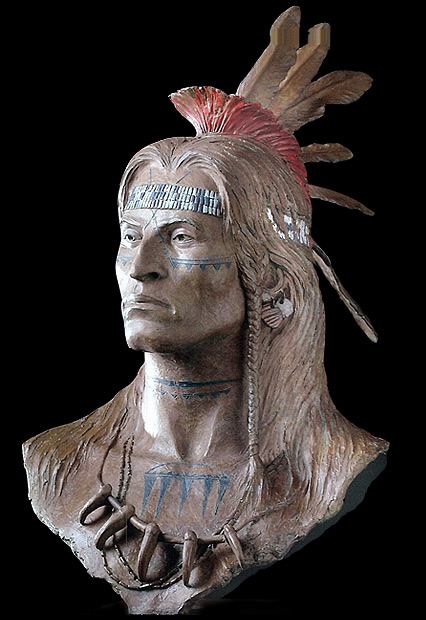
Bronze edition: 20 | Height: 29″
Last Sachem of the Narragansett
The Narragansett was the most powerful tribe in 17th century New England, according to William Hubbard in his “History of the Indian Wars” (1677), and Canonchet was able “to raise 4000 fighting men”.
The Puritans, fearful that the powerful Narragansetts would join the Indian uprising inspired by the Wanpanoag King Philip, launched a pre-emptive strike against their fort in the Great Swamp (near Kingston, Rhode Island) on December 19th, 1675. Canonchet, residing in another village a few miles away, thus became an implacable foe of the English.
Deferring to the superior number of warriors under his command, Canonchet now supplanted Philip at the supreme Indian military commander in Southern New England. Largely under his direction, the Indian Confederates achieved great success. They inflicted the highest per capita casualty rate of any subsequent American war. Of the 90 towns in New England, 52 were attacked and 19 were wholly destoyed. Per capita income in New England did not surpass the 1675 levels until 1815. “[Canonchet] maintained the war with his whole energy; and never had Philip been so prosperous, never had the English suffered so many disasters as for several months after the battle in the Great Swamp. Captains Pierce and Wadsworth, each with 50 men, were swallowed up…and village after village were burned and the inhabitants either massacred or compelled to fly…”
History of the Indians of Connecticut”, John W. de Forest (1851)
“But it was now full sea with Phillip his affairs: for soon after, the tide of his success began to turn…a victory by the English with invaluable aid of friend. – Indians soon followed: This victory was the more considerable, in that several of the chief captains of the enemy were at this time killed or taken; amongst whom was Cononchet…he was the chief Sachem of all the Narragansetts: great nephew of Cononicus and son of Miantinomo, and the heir of all his fathers pride and insolency, as well as his malice against the English…Wherefore forseeing that so many hundreds (of his followers) could not subsist without planting…to that end he ventured with but 30 men to fetch seed corn…leaving a body of men, not fewer than 1500, to follow…this adventure brought him to a snare from whence he could not escape. While fleeing his pursuers, slipped on a stone plunging him into the water, thus making his gun useless. A Pequot laid hold of him without his making any resistence; though he was a very proper man, of goodly stature and great courage of mind as well as strength of body. A young Englishman scarce 22 years old, yet adventuring to ask him a question, this manly Sachem looking with a little neglect (contempt?)…replied in broken English: ‘you much child, no understand matters of war; let your chief come, him I will answer’…acting herein as if some old Roman ghost had possessed the body of this western pagan: and like Attilius Regulus, he would not accept his own life, when it was tendered him, upon the low condition of compliance with the English.” He had formerly boasted that, they would fight it out to the last man rather than they would become servants to the English, “and to earlier English demands that he surrender any of Phillip’s men, replied that he would not deliver up a Wampanoag’s nail!”
“Now told his sentence was to die, he said, ‘he liked it well, that he should die before his heart was soft, or he had spoken anything unworthy of himself.’ He told the English that the killing of him would not end the war; but it was a considerable step there unto; nor did it live much longer after his death, at least in those parts: for after Sudbury fight when the sun of their hopes was at its highest, April 21st, (1676), it visibly declined, till it set in a night of obscure and utter darkness upon them all.”
“History of the Indian Wars” (1677), William Hubbard
“None of the most famous heroes of Rome have discovered a greater love of their country or a greater contempt of death than these people.”
Cadwallader Colden, 1727
“They are tall and straight, tread strong and clever and walk with a lofty chin.”
William Penn, 1681

